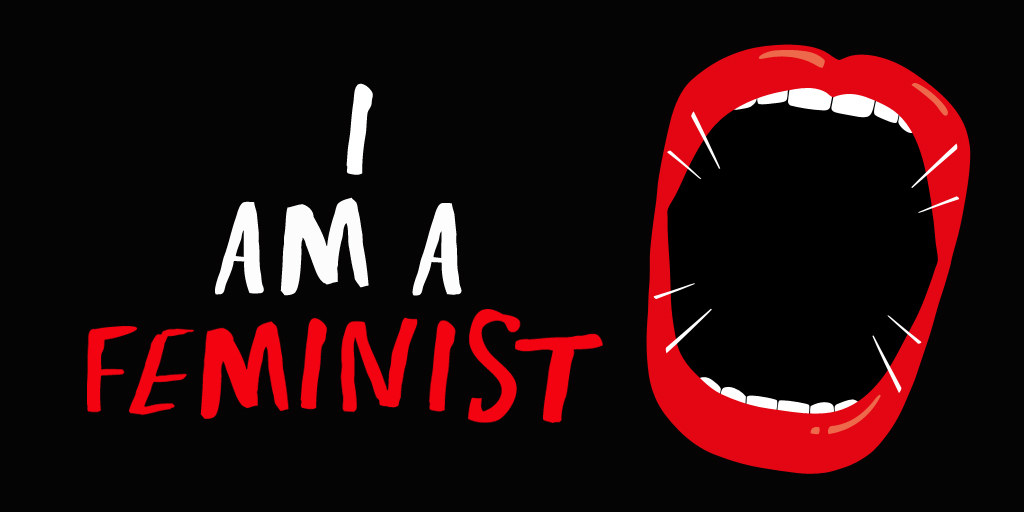

When her newest book, a hilarious and powerful ode to friendship and feminism, hit shelves last week, Holly Bourne should have been celebrating. Instead she was busy reporting and blocking abusive Twitter trolls.
The novel, What’s a Girl Gotta Do?, is the latest and last instalment of the Spinster Club series, following one student’s project to record and broadcast herself calling out every instance of sexism she witnesses for a month. Bourne's protagonist, Lottie, deals with an onslaught of sexist trolling for speaking her mind, and now, with the book's promotional hashtag, #IAmAFeminist trending worldwide, Bourne has found herself embroiled in a serious case of life imitating art.
"My colleagues, friends, readers were all suddenly experiencing the arc of the book."
“It's been very meta," said Bourne, who ultimately had to set her Twitter account to private to ward off abuse and threats. "Publicity is often the hardest part for me as an author anyway, and because this book’s about feminism, and because feminism is such an inflammatory word and issue, it’s been a lot harder. And it wasn’t just me, it was everybody on my timeline – all my colleagues, friends, readers. It was like all of us were suddenly experiencing the arc of the book. That’s never happened to me with a book before.”
But then What’s a Girl Gotta Do? was always going to be a story close to home for Bourne: It opens with an incident of harassment pulled straight from the author’s experience, one that inspired much of her work in the past couple of years; and the fictionalized version also drives her heroine, Lottie, to start her ambitious social justice project.
“When I moved to London,” Bourne recounts, “I found myself getting really badly sexually harassed for the first time in my life. It started to really get into my head and alter my behaviour: I had to get my boyfriend to come pick me up at the tube station because I was too scared to walk home by myself at night, I started to change what I wore to see if that would stop it happening.
"There was one really awful altercation with these two men who actually blocked my path. I thought they were going to attack me. I don’t think I’ve ever been so scared in my whole life; I sort of screamed at them and ran away. And when I turned around they were laughing. I still remember that laughter – I was traumatised, and they were laughing and that’s where I was just like, I have to do something. I need to do something. I thought, A girl doesn’t have to walk down the street and experience what I just experienced.”
The encounter inspired her to write the first book of the Spinster Club trilogy, the Bookseller YA Prize-shortlisted Am I Normal Yet?, and stayed with her all the way up to What’s a Girl Gotta Do?, where she put Lottie in her shoes. “I wanted to reclaim that experience, and use it to start the book. I think there’s power in owning a traumatic experience and using it to do something good in your life.”
"I think there’s power in owning a traumatic experience and using it to do something good in your life."
Incorporating trauma and social justice has always been a part of Bourne’s process; working at a youth charity exposed her to feminism and gender equality issues that have found their way into her books. “When I saw how gender roles were really upsetting girls and boys, I started reading up on feminism as an issue, and I was just like, ‘Oh my God, this something I really believe in.’ The books have been me exploring that and what that means; they’re really my own journey through feminism, novelised."
That journey has included grappling with some difficult issues, and trying to answer some hard questions – another thing Bourne has in common with Lottie, her protagonist. Calling out sexism is a big task, and a hard one to get right – as Lottie finds out when she’s questioned for wearing makeup during her project, or when she struggles to respect a friend’s decision to deal with an assault in private instead of calling the police, and as Bourne has found out when it comes to intersectionality and representation. “I think it’s really tricky,” says Bourne about the difficulties of approaching race, sexuality, and mental health in conjunction with feminism. “I’m not interested in trickle-down feminism – I don’t believe in this ‘Hey, hang on while we sort ourselves out and we’ll get to you later.’ I think that’s really wrong.”
But what’s best way for a writer to approach intersectional experiences when they haven’t faced them themselves? “Lots of authors can write outside their experience – you can write a book set in space without ever going to space. There are plenty of things you can feel completely comfortable with just doing lots and lots of research,” says Bourne. “But when it comes to gender identity, sexual preference, race, that’s too important and it’s really not my story to tell. It’s so emotive – people are angry, people are exhausted, they’re fed up with not seeing themselves, and that anger is really important. It’s really important to listen and respond to that anger. And I want to be an ally to women who are less privileged, but I think it’s still unclear how best to be an ally.”
"A middle-class girl living in the suburbs is really only the teeniest tip of the iceberg."
Bourne speculates that there’s a bigger issue within the publishing industry about how best to bring intersectional issues into play, particularly in young adult fiction. “There is a huge, huge lack of diversity in the UK YA market – most authors are white, female, a lot of them are middle-class, and I think that’s reflected in the stories. I'm writing about a middle-class girl living in the suburbs, but that's really only on the teeniest tip of the iceberg.
"It’s a huge industry problem, because you can’t be what you can’t see – there are girls out there who aren’t seeing authors and stories that reflect themselves.”

Bourne hopes young women grappling with mental health issues will see themselves reflected in her books. The first and, according the Bourne, most autobiographical book of the Spinster Club series, Am I Normal Yet? follows Evie, a feminist society member who lives with OCD, while What's a Girl Gotta Do? constantly explores the overlap between activism and mental health, particularly for a strong-willed young woman in a culture with so much institutional sexism.
"Self-care is so important. You can’t save the world every day. You’ll exhaust yourself."
Speaking about the activist burnout that Lottie goes through in the book, and perhaps a bit about her own recent experience with online trolling, Bourne defends the importance of respecting your limits. "I think self-care is so important for anybody who fights for what they believe in. You can’t save the world every day. You’ll exhaust yourself.
"Your mental health is the most important thing in helping other people, and if you’re not at the top of your pyramid, that will have a trickle-down effect. You won’t be at your most useful. During my time working at a youth charity, we had clinical supervisions, saw the psychotherapist, had debrief meetings. That training’s been really helpful, and I’ve found myself going back to it during this process and relying on it."
What's a Girl Gotta Do? also explores Bourne's desire for feminism to be more inclusive. She wants young people to know it's OK not to have it all figured out, and that anyone and everyone is allowed to be a feminist. "One of the concerns I have about feminism at the moment," she says, "is the idea that you have to pass a certain litmus test to be allowed to qualify as a feminist, and if you have one single aspect of your history, or your personality, or interests where you’re not the perfect example of what a feminist is, you’re attacked and therefore unqualified to talk. I think that silences a lot of people. In the book, I wanted to make it really clear that we’re always going to have double standards, you’re always going to slip up, and that’s OK. You’re still allowed a voice. You’re still allowed to fight."
"We’re always going to have double standards, you’re always going to slip up, and that’s OK. You’re still allowed a voice."
Bourne is insistent that feminism creates a safe space for boys, too. "I go into schools as part of my job," she says. "I talk to boys and girls about gender, and I kind of do a Mean Girls thing: I have them all close their eyes and I say, 'Put your hand up if you think a human being should be treated the same regardless of gender,' and they all put their hands up. And I get to say, 'Congratulations, you’re all feminists.'
"It helps boys realise it’s not an attack. I’m not about attacking boys and men; feminism is about empowering them as well. Their issues are really important. I think so many boys think they can’t engage with feminism, that it’s about neutralising them or hating them, and it’s not that at all. I’m just as worried for boys as I am for girls."
More than anything, Bourne hopes that her work – and Lottie’s – in being vocal about the institutional sexism she’s experienced will help precipitate bigger change and encourage others to speak out about their own experiences with sexism, no matter how small. "I think, a lot of the time, when feminists call out minor things, they are sometimes attacked and told, ‘Well that’s just silly,’ or ‘You should be focusing on this big thing.’
“But these teeny tiny things do lay the foundation for medium things, and those medium things lay the foundation for the big things, which lay the foundation for the horrendous things – so we should never feel bad for calling out something we think is damaging, even if it’s tiny.”
"You have a right to talk, a right to fight, and you should just start owning that."
It’s this idea she hopes her book passes on to her young readers: “Your experience matters, your anger matters, your voice matters,” she says, echoing the rallying afterword she’s attached to What’s a Girl Gotta Do? “You have a right to talk, a right to fight, and you should just start owning that. We’re not going to do this alone. I want young people, boys as well as girls, to understand how powerful they really are. So these books aren’t just about feminism, it’s about getting young people to see you guys can really change the world.”
